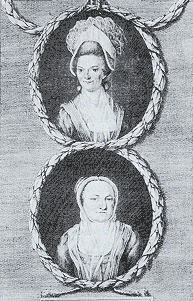Betje Wolff
Elizabeth ("Betje") Wolff-Bekker (24 July 1738 – 5 November 1804) was a Dutch novelist who, with Agatha "Aagje" Deken, wrote several popular epistolary novels such as Sara Burgerhart (1782) and Willem Levend (1784).

Biography
Betje Bekker was born into a wealthy Calvinist family at Vlissingen. On 18 November 1759, at the age of 21, she married the 52-year-old clergyman Adriaan Wolff. In 1763 she published her first collection Bespiegelingen over het genoegen ('Reflections on Pleasure'). After her husband's death in 1777, she lived for a time with Aagje Deken in France.[1] From then on the two women published their work together; it is somewhat difficult to determine the exact qualities contributed by each.[1] They specialized in epistolary novels in the mold of Samuel Richardson.[2]
Because of their patriotic sympathies they moved to Trévoux in Burgundy in 1788. In 1789 they published Wandelingen door Bourgogne. She was exposed to some of the dangers of the French Revolution, and, it is said, escaped the guillotine only by her great presence of mind. In 1795 she returned to the Netherlands, and resided at the Hague till her death there at the age of 66.[3]
Works
See also
References
-

- Brian Westerdale Downs and Henry Latimer Jackson (1921). A Manual of the Dutch Language. Cambridge University Press (Cambridge). p. 74.
-

External links
| Wikimedia Commons has media related to Betje Wolff. |
- Works by Elizabeth Bekker Wolff at Project Gutenberg
- Works by or about Betje Wolff at Internet Archive
- Works by Betje Wolff at LibriVox (public domain audiobooks)
